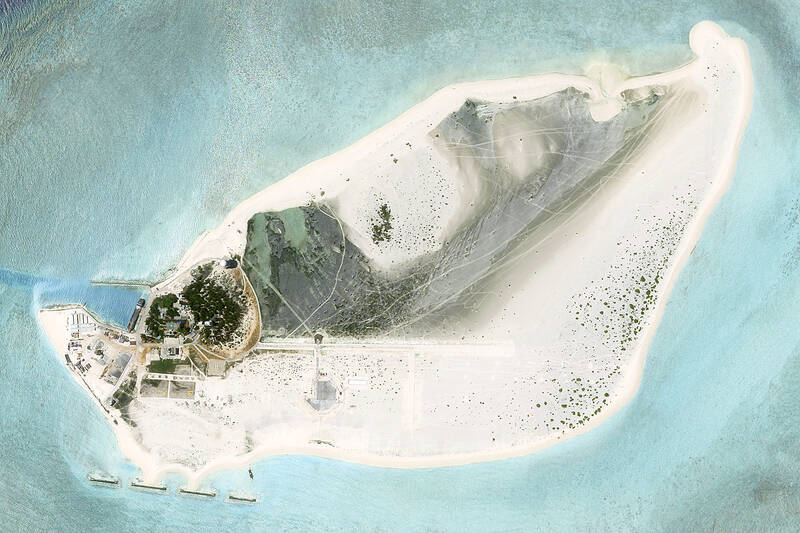The Chinese People’s Liberation Army (PLA) is constructing a new counter-stealth radar system on a disputed reef in the South China Sea that would significantly expand its surveillance capabilities in the region, satellite imagery suggests.
Analysis by London-based think tank Chatham House suggests China is upgrading its outpost on Triton Island (Jhongjian Island, 中建島) on the southwest corner of the Paracel Islands (Xisha Islands, 西沙群島), building what might be a launching point for an anti-ship missile battery and sophisticated radar system.
“By constraining the US ability to operate stealth aircraft, and threaten stealth aircraft, these capabilities in the South China Sea send a powerful signal to US allies and partners in the region that the US advanced technologies may not be able to stand up to the PLA,” said Michael Dahm, a senior resident fellow at the Mitchell Institute for Aerospace Studies.

Photo: AP
Similar counter-stealth radars, known as SIAR, or synthetic impulse and aperture radar, have been built to the south, on Subi Reef (渚碧礁) in the Spratly Islands (Nansha Islands, 南沙群島), and China’s Hainan Island, to the north.
The construction on Triton would close a gap in its coverage. “Triton Island is another brick in the wall,” Dahm said.
Triton, a reef of about 120 hectares, lies in the farthest southwest corner of the Paracels, an archipelago controlled by China since a violent conflict with Vietnam in 1974. It is also claimed by Taiwan and Vietnam.
Any construction on Triton — which is 135 nautical miles (250km) east of Vietnam’s mainland, and 170 nautical miles south of China’s Hainan — is likely to be of concern to Hanoi.
The structures on Triton would “significantly diminish [Vietnam’s] capacity to operate undetected in the area,” the analysis said.
“Alongside existing radar on Triton which can detect sea-going vessels, Beijing now has the potential to track Vietnamese air movements and gain forewarning of Hanoi’s maneuvers in the area, including efforts to access oil and gas deposits,” it said.
The radar might also complicate attempts by the US, the UK and Australian navies to navigate in the surrounding waters, it added.

MONEY GRAB: People were rushing to collect bills scattered on the ground after the plane transporting money crashed, which an official said hindered rescue efforts A cargo plane carrying money on Friday crashed near Bolivia’s capital, damaging about a dozen vehicles on highway, scattering bills on the ground and leaving at least 15 people dead and others injured, an official said. Bolivian Minister of Defense Marcelo Salinas said the Hercules C-130 plane was transporting newly printed Bolivian currency when it “landed and veered off the runway” at an airport in El Alto, a city adjacent to La Paz, before ending up in a nearby field. Firefighters managed to put out the flames that engulfed the aircraft. Fire chief Pavel Tovar said at least 15 people died, but

LIKE FATHER, LIKE DAUGHTER: By showing Ju-ae’s ability to handle a weapon, the photos ‘suggest she is indeed receiving training as a successor,’ an academic said North Korea on Saturday released a rare image of leader Kim Jong-un’s teenage daughter firing a rifle at a shooting range, adding to speculation that she is being groomed as his successor. Kim’s daughter, Ju-ae, has long been seen as the next in line to rule the secretive, nuclear-armed state, and took part in a string of recent high-profile outings, including last week’s military parade marking the closing stages of North Korea’s key party congress. Pyongyang’s official Korean Central News Agency (KCNA) released a photo of Ju-ae shooting a rifle at an outdoor shooting range, peering through a rifle scope

South Korea would soon no longer be one of the few countries where Google Maps does not work properly, after its security-conscious government reversed a two-decade stance to approve the export of high-precision map data to overseas servers. The approval was made “on the condition that strict security requirements are met,” the South Korean Ministry of Land, Infrastructure and Transport said. Those conditions include blurring military and other sensitive security-related facilities, as well as restricting longitude and latitude coordinates for South Korean territory on products such as Google Maps and Google Earth, it said. The decision is expected to hurt Naver and Kakao

Australian Prime Minister Anthony Albanese yesterday said he did not take his security for granted, after he was evacuated from his residence for several hours following a bomb threat sent to a Chinese dance group. Albanese was evacuated from his Canberra residence late on Tuesday following the threat, and returned a few hours later after nothing suspicious was found. The bomb scare was among several e-mails threatening Albanese sent to a representative of Shen Yun, a classical Chinese dance troupe banned in China that is due to perform in Australia this month, a spokesperson for the group said in a statement. The e-mail